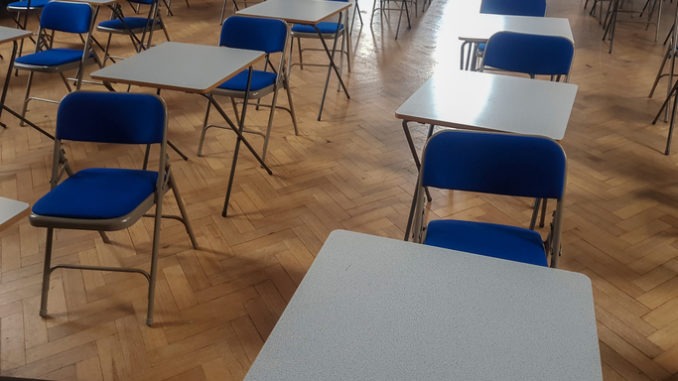
Most schools will be placing an emphasis on using exam-style papers this summer to assess students for GCSEs, A-levels and other qualifications following the government’s decision to cancel public exams, a survey by the Association of School and College Leaders has found
Fifty three per cent will be giving greater weighting to exam-style papers than other forms of assessments, while seven per cent will base grades on exam-style papers only.
The government, Ofqual, and the exam boards have handed the responsibility of assessing students in lieu of public exams to schools and colleges. They have asked them to use evidence which can include assessments based on questions and past papers provided by exam boards, non-exam assessment, other coursework, substantial class or homework, and mock exams taken over the course of study. There is little direction on what types of assessment should be prioritised or the weighting that should be given to them in reaching the overall grade.
ASCL carried out a survey this week of school and college headteachers and principals in England. Of the 521 respondents:
- Seven per cent said grades will be based on exam-style papers, sat in exam-style conditions (whether in classrooms or exam halls) only.
- 53% said grades will be based on a combination of exam-style papers and non-exam evidence, but with greater weighting given to exam-style papers.
- 26% said grades will be based on a combination of exam-style papers and non-exam evidence, with roughly equal weighting given to each.
- Six per cent said grades will be based on a combination of exam-style papers and non-exam evidence, but with greater weighting given to non-exam evidence.
- Six per cent said grades will be based only on non-exam evidence.
Reasons for basing grades entirely on exam-style papers included disruption caused by lockdowns and isolation which made it a struggle to identify other consistent, quality evidence; the assurance it gave that the entire cohort was assessed on the same evidence; and that it was pupils’ own work.
Those using a combination of evidence with greater weighting given to exam-style papers felt non-exam evidence could help to inform decisions but the emphasis on exam-style papers provided reliable evidence based on pupils’ own work.
Those giving equal weighting to exam-style papers and non-exam evidence felt this approach achieved a fair balance between using exam-style papers while recognising that public exams had been cancelled, and using the opportunity to submit a range of evidence.
Reasons for giving more weight to non-exam evidence included already having a significant amount of assessment evidence on which to base grades, and concern about placing weight on exam-style questions after public exams were cancelled.
Those opting for only non-exam evidence felt that teacher judgements were the fairest approach given the scale of disruption over the past year and the variability of students’ experiences of learning over that time.
Geoff Barton, general secretary of the Association of School and College Leaders, said: “Schools and colleges have clearly thought very carefully about how they assess students this summer and have made decisions on their best judgement of what represents the fairest approach for their students in their circumstances.
“We should not be surprised about the variability in approaches given that there are very few parameters about how this should be done and a wide range of differing experiences over the past year. We argued for this flexibility so that schools and colleges were free to use their judgement about what best suited their context and we are not going to criticise it now.
“But it is important that parents, politicians and the commentariat understand that there is no one-size-fits-all model out there, and nobody thinks that any of this is ideal. It is very much about making the best of a difficult situation and awarding young people with grades as fairly as possible so they can progress to the next stage of their lives.
“We understand that the public may be confused by the fact that, on one hand, the government cancelled public exams, and on the other hand, many schools will be using exam-style questions and papers to assess students. However, there are sound reasons for this approach and it is important to understand that schools will be formulating these assessments in line with their knowledge of the content their students have been able to cover during the pandemic.
“A big challenge is obviously going to be ensuring that standards are consistent nationally across all these different approaches. Schools and colleges will be assessing evidence against common grade descriptors, and there will be internal and external quality assurance processes. Everything possible is being done to ensure that grades are fair and consistent.
“It is also important to recognise that this process represents an enormous amount of work and additional pressure on schools, colleges, and their staff, following on from the tumultuous and extremely demanding period of the pandemic. It is essential that the government and regulators do everything possible to support them in this very challenging task.”
The ASCL survey was conducted from 19-21 April by emailing a survey link to 3,228 members who are headteachers and principals in schools and colleges in England. Most of the 521 responses (77%) were from state-funded secondary schools, while 18% were from independent schools, and the remainder came from colleges, and other types of schools.



Be the first to comment